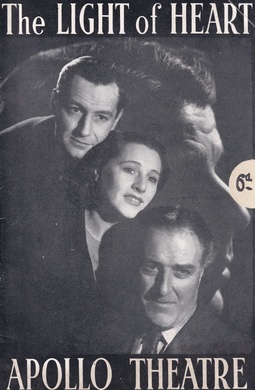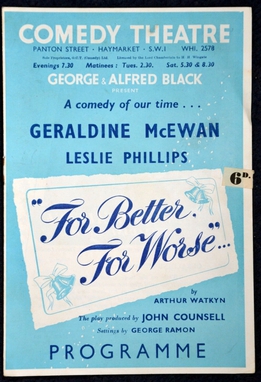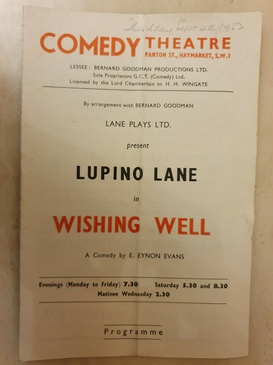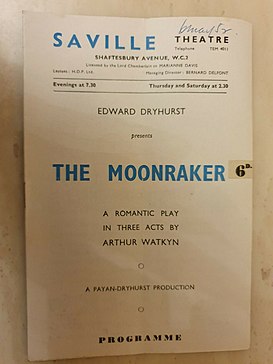
To Dorothy, a Son is a 1950 comedy play by the British writer Roger MacDougall. The plot revolves around a complex inheritance in which the American ex-wife of a man tries to prevent his current pregnant wife giving birth before a certain day, in order that she can claim the money.
The Old Man is a 1931 mystery play by the British writer Edgar Wallace. Its original production was staged at Wyndham's Theatre in London's West End for a ninety performance run. It is set entirely in the "Coat of Arms" tavern where a mysterious old man lurks in the background, reputedly an escapee from a lunatic asylum. The original cast included Alfred Drayton, Jack Melford, Harold Warrender and Finlay Currie.
Dorothy Brandon was a British playwright active in the interwar years. Her greatest West End success was the 1923 medical drama The Outsider which was revived several times, and adapted into films on three occasions.
Wild Heather is a 1917 play by the British writer Dorothy Brandon. A woman looking to marry has to choose between two very different men.
The French Mistress is a comedy play by the British entertainer Sonnie Hale under the pen name Robert Munro about the arrival of a new young French teacher at a traditional public school.
The River is a 1925 play by the British writer Patrick Hastings. It is set in West Africa, where two diamond hunters are in love with the same woman.

The Light of Heart is a 1940 play by the British writer Emlyn Williams.
Who Goes There! is a 1950 comedy play by the British writer John Dighton. The action takes place entirely around St James's Palace.

Paddy the Next Best Thing is a 1908 romantic comedy novel by the British writer Gertrude Page.

Escapade is a 1952 play by the British writer Roger MacDougall.

The Holly and the Ivy is a 1950 play by the British writer Wynyard Browne. A vicar attempts to deal with the various problems of his family as they gather for the Christmas period.

His Excellency is a 1950 play by the British writers Campbell Christie and Dorothy Christie. A former docker takes over as the British governor of an island colony in the Mediterranean.

The Gentle Gunman is a 1950 thriller play by the British writer Roger MacDougall. A former IRA gunman attempts to renounce his violent past, as he is now convinced a non-violent approach is best.

Castle in the Air is a comedy play by the British writer Alan Melville, which was originally performed in 1949.

The Nutmeg Tree is a 1937 comedy novel by the British writer Margery Sharp, which was adapted as a play and a film. Julia an actress and showgirl is down on her luck in London when she receives an unexpected invitation to France. Many years before she had a daughter, but her father was killed in the First World War and the girl went to live with his wealthy relations. Now Julia is invited by her daughter to run her eye over a prospective fiance. After meeting him, Julia becomes convinced he is utterly unsuitable for her daughter, as he has a wild, reckless personality much closer to her own.
Peter Blackmore (1909–1984) was a British playwright and screenwriter. His play Miranda was adapted into the 1948 film of the same title. He also wrote the comedy play The Blue Goose which appeared in the West End in 1941. His 1953 play Down Came a Blackbird ran for 53 performances at the Savoy Theatre. He worked on the screenplays for a number of comedy films for British Lion and the Rank Organisation, including two Norman Wisdom vehicles.

For Better, for Worse is a comedy play by the British writer Arthur Watkyn. It was first performed at the Q Theatre in Kew Bridge in 1948. It enjoyed a lengthy and successful run at the Comedy Theatre in London's West End where it lasted for 618 performances between 17 December 1952 and 12 June 1954. The original West End cast included Leslie Phillips, Geraldine McEwan, Tom Macaulay, Anthony Sharp, Gwynne Whitby, Polly Elwes, Aimée Delamain, Charles Lamb and Dandy Nichols. It was directed by Kenneth Riddington who also appeared in the cast. The plot revolves around the trials and tribulations of a newly-married couple.

Wishing Well is a comedy play by the British writer Eynon Evans. It was first staged at the Grand Theatre, Wolverhampton in 1946. It ran for 44 performances at the Comedy Theatre between 4 September and 11 October 1952. The West End cast included Evans, Lupino Lane, Glyn Houston, Douglas Argent and Patsy Smart. The owner of the Wishing Well inn tries to solve various people's problems.

For the James Bond novel of similar title, see Moonraker.

Murder Mistaken is a 1952 thriller play by the British author Janet Green. It first appeared at the Prince of Wales Theatre in Cardiff under the title Teddy Bare's Picnic. It then transferred to London's West End under its new title first at the Ambassadors Theatre and then at the Vaudeville Theatre. It's West End run lasted 156 performances between 4 November 1952 and 28 March 1953. The West End cast included Derek Farr, Anthony Marlowe, Phyllis Morris, Iris Hoey, Brenda de Banzie, Patricia Burke and Rosalie Crutchley. It appeared on Broadway under the alternative title Gently Does It, lasting for thirty seven performances at the Playhouse Theatre. Green wrote a novelisation in 1953 with Leonard Gribble.













